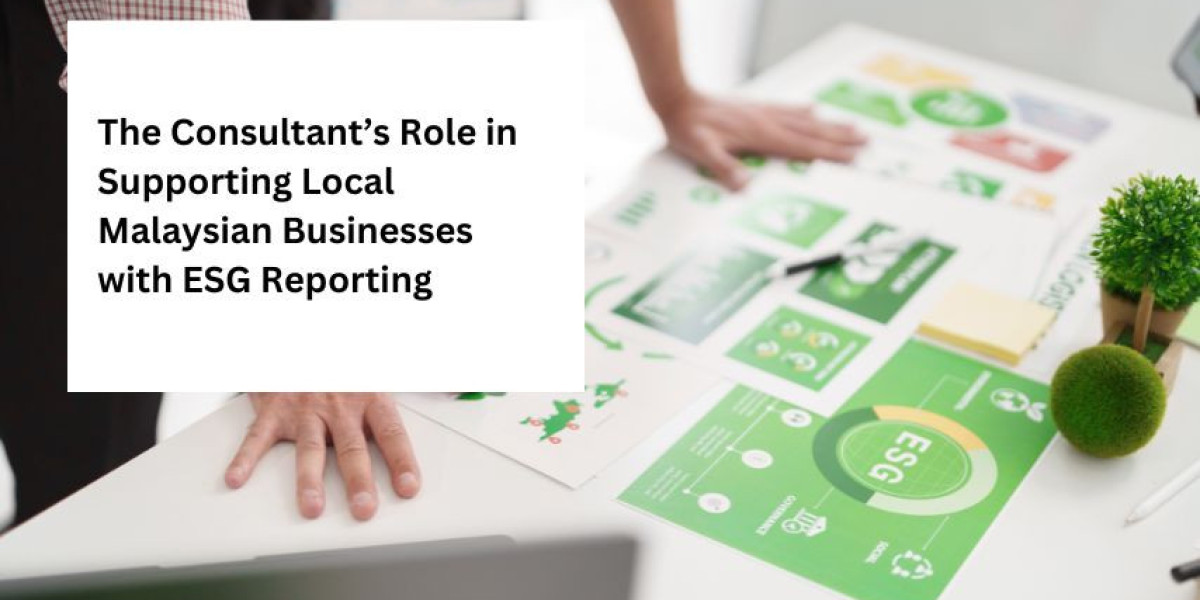Environmental, Social, and Governance (ESG) criteria have evolved from a niche interest into a core component of global business strategy. For Malaysian businesses, understanding and integrating ESG is no longer optional—it is a critical factor for long-term resilience, investor confidence, and market access. As companies navigate this complex landscape, the role of specialized consultants has become indispensable. They act as guides, strategists, and partners, helping local enterprises overcome challenges and unlock the opportunities inherent in sustainable practices.
This article explores the crucial role consultants play in supporting local Malaysian businesses with ESG reporting. We will delve into the growing importance of ESG in the region, the specific hurdles local companies face, and how expert guidance can transform compliance from a burden into a strategic advantage. Finally, we will look ahead at future trends to keep your business prepared.
The Rise of ESG in Malaysia: A New Business Imperative
ESG is a framework used to assess a company's performance on a wide range of sustainability and ethical issues. It provides a holistic view of a business beyond traditional financial metrics.
- Environmental:This pillar covers a company's impact on the natural world. It includes energy consumption, waste management, pollution, natural resource conservation, and efforts to combat climate change.
- Social:This relates to how a company manages relationships with its employees, suppliers, customers, and the communities where it operates. Key areas include labor standards, health and safety, diversity and inclusion, and data privacy.
- Governance:This deals with a company's leadership, executive pay, audits, internal controls, and shareholder rights. It ensures transparency, accountability, and ethical behavior at the corporate level.
Globally, the push for ESG is driven by investor demand, consumer awareness, and tightening regulations. Malaysia is no exception. The Malaysian government and regulatory bodies have actively promoted sustainable practices. Initiatives like the FTSE4Good Bursa Malaysia (F4GBM) Index and Bursa Malaysia's mandatory sustainability reporting requirements for public listed companies (PLCs) have placed ESG firmly on the national agenda.
This shift means that businesses of all sizes, not just PLCs, are feeling the pressure to demonstrate their ESG credentials. Supply chain partners, financial institutions, and international clients are increasingly scrutinizing the sustainability performance of their Malaysian counterparts. Strong ESG reporting is becoming a prerequisite for securing financing, attracting talent, and maintaining a competitive edge.
The Hurdles: Why Malaysian Businesses Struggle with ESG Reporting
While the importance of ESG is clear, the path to effective reporting is filled with obstacles, particularly for small and medium-sized enterprises (SMEs) that form the backbone of Malaysia's economy. These challenges can be grouped into three main categories.
Regulatory and Data Complexity
The ESG landscape is a patchwork of different standards and frameworks, such as the Global Reporting Initiative (GRI), the Sustainability Accounting Standards Board (SASB), and the Task Force on Climate-related Financial Disclosures (TCFD). For a local business, determining which framework to follow can be overwhelming. Furthermore, Bursa Malaysia's requirements are evolving, demanding more sophisticated disclosures over time.
Collecting the necessary data is another significant hurdle. Many companies lack the systems to track metrics like carbon emissions, water usage, or employee turnover rates accurately. This data often resides in separate departments—HR, operations, finance—making consolidation and analysis a monumental task without a unified strategy.
Financial and Resource Constraints
Implementing a comprehensive ESG program requires investment. This includes dedicating staff time, investing in data collection technologies, and potentially undergoing audits or certifications. For many Malaysian businesses, especially SMEs operating on thin margins, these upfront costs can seem prohibitive.
The perception of ESG as a cost center rather than an investment in long-term value creation is a common barrier. Without a clear understanding of the potential ROI—such as improved operational efficiency, lower energy costs, or enhanced brand reputation—business leaders may be hesitant to allocate the necessary budget.
Lack of In-House Expertise and Operational Integration
ESG reporting is a specialized field. It requires a deep understanding of sustainability principles, data analytics, and regulatory nuances. Most local companies do not have dedicated sustainability teams or employees with the required expertise. This knowledge gap can lead to superficial, non-compliant reports that fail to meet stakeholder expectations.
Moreover, ESG cannot be managed in a silo. It must be integrated into the core business strategy and day-to-day operations. This involves changing processes, training employees, and fostering a corporate culture that values sustainability. Achieving this level of operational integration is a complex change management process that many businesses are ill-equipped to handle on their own.
The Consultant's Critical Role: From Challenge to Opportunity
This is where a trusted ESG consultant steps in. They bridge the gap between a company's current state and its ESG ambitions, providing the expertise, tools, and strategic guidance needed to navigate the complexities of sustainability reporting.
Providing Specialized Expertise and Strategic Direction
An experienced consultant brings a wealth of knowledge to the table. They stay current with the latest global and local reporting standards, regulatory changes, and industry best practices. Their first step is often to conduct a materiality assessment—a process to identify the ESG issues that are most relevant to the business and its stakeholders.
This assessment forms the foundation of the ESG strategy. The consultant helps the company define clear, achievable goals and key performance indicators (KPIs). Instead of a one-size-fits-all approach, they tailor the strategy to the company's specific industry, size, and operational realities, ensuring the efforts are focused and impactful.
Developing Frameworks and Data Management Systems
One of the most valuable contributions a consultant makes is bringing structure to the chaos of ESG data. They help businesses develop a robust framework for data collection, management, and analysis. This often involves:
- Identifying Data Sources:Pinpointing where critical information resides within the organization.
- Establishing Data Collection Processes:Creating simple, repeatable methods for gathering data, whether through software, spreadsheets, or manual tracking.
- Ensuring Data Quality:Implementing checks and balances to ensure the data is accurate, consistent, and auditable.
By building these systems, consultants empower businesses to move beyond ad-hoc reporting and develop a continuous, data-driven approach to managing their ESG performance. This not only simplifies the annual reporting process but also provides management with valuable insights for decision-making.
Facilitating Stakeholder Engagement and Communication
Effective ESG reporting is about more than just publishing a report. It's about communicating a compelling story to various stakeholders, including investors, customers, employees, and regulators. Consultants are skilled communicators who can help businesses craft a narrative that is both authentic and impactful.
They guide companies in engaging with stakeholders to understand their expectations and concerns. This feedback loop is crucial for refining the ESG strategy and ensuring the report addresses the issues that matter most. The consultant then helps translate complex data into a clear, engaging, and transparent sustainability report that builds trust and enhances brand reputation.
The Future of ESG: What's Next for Malaysian Businesses?
The world of ESG is not static. New trends and regulations are constantly emerging, and businesses must be prepared to adapt. Consultants play a vital role in helping companies stay ahead of the curve.
Increasing Regulatory Scrutiny and Standardization
Regulators in Malaysia and globally are moving towards more standardized and mandatory ESG disclosures. The introduction of standards from the International Sustainability Standards Board (ISSB) is set to create a global baseline for reporting. Consultants are essential for interpreting these new requirements and helping businesses align their reporting practices accordingly. The expectation for third-party assurance or audits of sustainability reports will also grow, making robust data systems even more critical.
Focus on Supply Chain Transparency
The ESG lens is expanding beyond a company's own operations to its entire value chain. Businesses will be increasingly expected to report on the sustainability performance of their suppliers. Consultants can help companies develop supplier codes of conduct, conduct supply chain audits, and implement systems to track ESG risks and performance throughout their network.
The Rise of "S" and "G"
While the "E" for environmental has often dominated the conversation, the "S" for social and "G" for governance are gaining prominence. Issues like employee well-being, mental health, diversity, equity, and inclusion (DEI), and ethical AI are becoming key areas of focus for stakeholders. Consultants can provide specialized expertise to help businesses develop meaningful policies and programs in these complex areas.
Conclusion
The journey toward meaningful ESG integration and reporting is a marathon, not a sprint. For local Malaysian businesses, the path can be fraught with challenges, from navigating complex regulations to overcoming resource constraints. However, these challenges also present a profound opportunity to build more resilient, efficient, and reputable enterprises.
ESG consultants are more than just report writers; they are strategic partners who provide the roadmap, the tools, and the expertise to turn ESG compliance into a competitive advantage. By helping companies define their strategy, manage their data, and communicate their story, they empower businesses to meet the demands of today while preparing for the opportunities of tomorrow. For any Malaysian business leader looking to thrive in an increasingly conscious marketplace, engaging an ESG consultant is a strategic investment in a sustainable and prosperous future.



